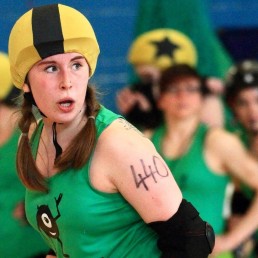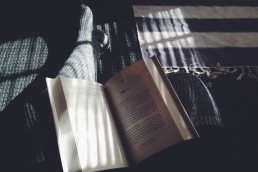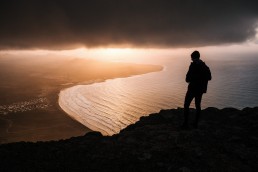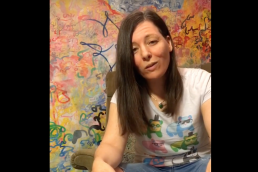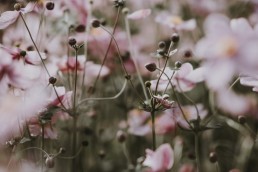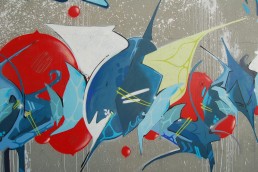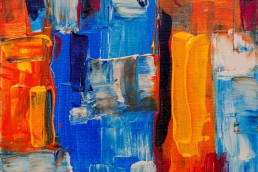by Christie Mackie
Collage: Ida Henrich
Growing up, I dabbled in music extensively. My childhood was something of a musical smorgasbord: I took violin lessons for a couple of years in primary school, I sung in the children’s chorus of an opera, I messed around with my dad’s guitars and a keyboard gathering dust in the spare bedroom. I applied to go on Stars in their Eyes: Kids (as Amy Lee from Evanescence, because I know you’re all wondering – I fancied myself as a bit of a goth). I also acquired a bass guitar and tried to start an ill-fated band (RIP The Goddesses) at the age of eleven that, sadly, was doomed to exist only in our collective imagination.
It wasn’t until I was about fourteen that I started to feel like a proper musician; I started singing lessons during high school and then singing became my whole life, bringing me immense comfort. I was in every school choir going, often singing the soprano solos. Everything revolved around my voice. My behaviour as a teenager was absolutely impeccable, for fear of the so-called ‘butterfly effect’; I believed even the tiniest transgression could ruin my future opera career so I barely touched alcohol. I resisted all those piercings I wanted. And God forbid I eat macaroni cheese before a concert.
During high school, when I first admitted I might be bisexual, various friends told me I “probably wasn’t” and, as my wannabe opera singer persona developed, I stopped thinking about it. I hid any hint of emotional turmoil behind a façade of fantasy: I was to be an internationally-renowned soprano, married to a gorgeous Italian tenor, with two-point-four children, and living in a very specific yellow villa that we drove past on a school trip to Venice. The more I embroidered the intricacies of these daydreams, the more ludicrous it seemed that I might be attracted to women too. After all, I had never heard of a queer female opera singer, or even a famous queer female classical musician in general. Could such a thing exist? Gay men seemed to be well-represented in the world of classical music, but we were never taught about the likes of Marin Alsop or Ethel Smyth. I actually only learnt of the latter by Googling “queer classical composers.” It’s an irrefutable fact – if women in general are underrepresented in the canon of western art, including music, queer women are, by and large, invisible.
It’s an irrefutable fact – if women in general are underrepresented in the canon of western art, including music, queer women are, by and large, invisible.
I came out as bi in 2015, and by that point, I had very much taken a step back from performance. I still sang in choirs, but I realised that pushing myself to be the ‘best’ singer I could be was taking a huge toll on my mental health. I was studying for a music degree, but had to drop out of concerts and class performances because I was too depressed to even breathe correctly. I decided to not only step out of the limelight, but to get off the stage altogether. Coupled with negative experiences aplenty; lecturers who double-crossed me, conductors who told me anxiety was a cop out for a poor audition, I felt like less and less of a musician. Instead I focused on music psychology – namely, how engaging in particular musical activities affects how we perceive our own identities. I was desperately trying to understand myself, not only as a queer woman, but also in terms of how I fitted into the musical community by which I’d been so often let down.
My dissertation discussed, ‘the impact of music participation on identity and wellbeing in the LGBT community.’ As I delved into my research, I discovered music can empower in many ways – it’s not all about getting up on stage. My research involved field work among local LGBTQIA+ choirs combined with a survey that sought to form a link between queer listening habits and identity perception. I had fully expected the benefits of singing in a choir to far outweigh those of just listening to music (whether live or recorded), but to my surprise, they were revealed to be much the same. Both offered a sense of belonging and increased comfort in one’s sexuality or gender identity. The only real difference was how accessible each type of activity was and its compatibility with one’s existing skills and traits. Regardless, both listeners and singers found engaging in LGBTQIA+-focused musical activity to be enormously powerful.
It’s only now, two years out of university, that I’m starting to notice these benefits for myself. I sang with one of my research choirs on and off for two years and spending time with a group of like-minded queer people of all ages and walks of life was incredibly reassuring. I’m no longer with the choir, instead, I’ve recently started playing guitar more seriously. I’m a recent graduate of Girls Rock School (a not-for-profit organisation offering donated lessons in guitar, bass, drums and vocals to women and non-binary people with the aim of increasing women’s visibility in bands) and spend hours every week losing myself to playing riot grrrl and punk songs through an amp cranked up to ten. It feels like the ultimate freedom of expression – breaking the rules, making a noise, standing up for what I believe in. In a way, playing rock guitar is very much a microcosm of queerness.
As I become more comfortable in my bisexuality, the role music plays in my life evolves. Despite my BMus degree, I sometimes worry I’m not really a musician, but in many ways, I feel more musical than I have in years. I’ve realised that – as with many things in life – from my career to my relationships to my queerness – the only way I’m likely to succeed is if I live authentically and strum to my own rhythm.
Christie Mackie
Christie is a chronic daydreamer and worrywart in her early 20s. When not busy with her fundraising day job, she plays roller derby, reads, bakes and tries to lift heavy weights. She can often be found musing about mental health and social justice issues.

